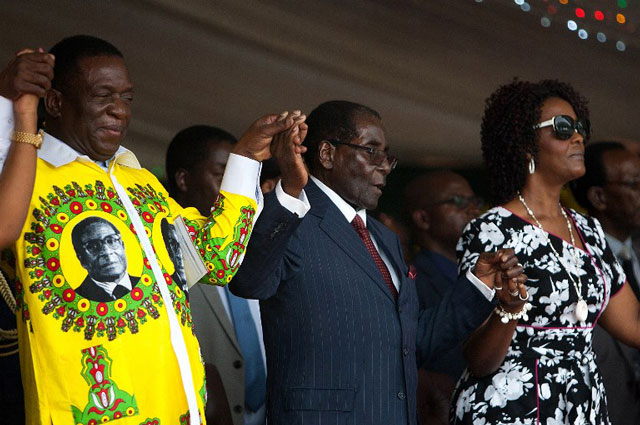
Harare, Zimbabwe | AFP | Emmerson Mnangagwa appeared well-placed to reprise his leading role in Zimbabwe after returning to the country in the wake of the army’s takeover, prompted by his sacking by President Robert Mugabe.
Nicknamed “Ngwena” (The Crocodile) because of his fearsome power and ruthlessness, the 75-year-old has a reputation for taking no prisoners — but appeared to have been outfoxed by Grace Mugabe.
The first lady, who is 41 years younger than her husband, apparently convinced the veteran head of state to ditch his long-serving lieutenant to further her own political ambitions.
It was the climax of a long feud between Grace and Mugabe’s then deputy to be in pole position to replace the ailing leader when he died or retired.
Mnangagwa initially fled to South Africa and published a stinging five-page rebuke of Mugabe’s leadership and Grace’s ambition.
But Mnangagwa travelled back to Zimbabwe on Thursday after the army’s dramatic seizure of power.
Analysts say he is well placed to assume a leadership role.
“I think the army are in negotiations with Mugabe and Mnangagwa,” Derek Matyszak, an analyst at the Pretoria-based Institute for Security Studies, told AFP.
“The easiest way to present a veneer of legality is that Mugabe reappoints Mnangagwa as vice president, briefly — Mugabe then retires.”
Under Zimbabwe’s constitution, the first vice president would automatically become acting president for 90 days.
Matyszak suggested ZANU-PF would agree on a new party leader in that time who would also become president “which would undoubtedly be Mnangagwa”.
In the early days after independence from Britain in 1980, Mugabe made Mnangagwa, who was then a young trainee lawyer, minister for national security.
Since then Mnangagwa occupied a host of cabinet positions — but relations between him and his political mentor have not always been cosy, and the younger man is no stranger to presidential purges.
Following his removal last week, Mnangagwa issued a searing five-page condemnation of Grace’s ambition and Mugabe’s leadership style.
In 2004 he lost his post as the secretary for administration in the ruling ZANU-PF party after being accused of openly angling for the post of vice president.
Four years in the political wilderness followed, during which his then rival Joice Mujuru became vice president and the favourite to succeed Mugabe.
She was ultimately deposed following a campaign orchestrated by Grace Mugabe who convinced the president she was not to be trusted.
– Political comeback –
The 2008 elections, when he was made Mugabe’s chief election agent, changed Mnangagwa’s fortunes.
Mugabe lost the first round, but his supporters were not going to make the same mistake in the second, which was marred by violence, intimidation and allegations of vote rigging.
In the same year Mnangagwa took over as head of the Joint Operations Command, a committee of security chiefs which has been accused by rights groups of organising violent campaigns to crush dissent.
He was targeted by EU and US sanctions imposed on Mugabe and his close allies over the elections and violence, but promptly given control of the powerful defence ministry.
It was a return to the home that made him a force in Zimbabwean politics in the first place.
– Anti-colonial fighter –
Born in the southwestern Zvishavana district on September 15, 1942, he completed his early education in Zimbabwe before his family relocated to neighbouring Zambia.
His grandfather was a traditional leader and his father a political agitator for the repeal of colonial laws that disadvantaged blacks.
In 1966, Mnangagwa joined the struggle for independence from Britain, becoming one of the young combatants who helped direct the war after undergoing training in China and Egypt.
He was arrested and sentenced to death but his sentence was later commuted to 10 years in prison because of his young age.
– ‘Destroy and kill’ –
After independence in 1980, he directed a crackdown on opposition supporters that claimed thousands of lives in the Matabeleland and Midlands provinces.
He once remarked that he had been taught to “destroy and kill” — although he later claimed to be a born-again Christian.
Takavafira Zhou, a political analyst at Masvingo State University, previously described Mnangagwa as “a hardliner to the core”.
 The Independent Uganda: You get the Truth we Pay the Price
The Independent Uganda: You get the Truth we Pay the Price


